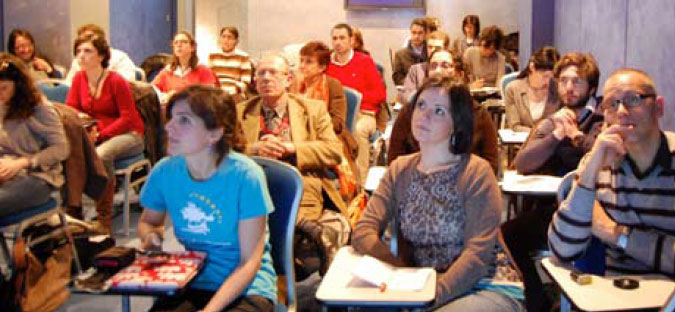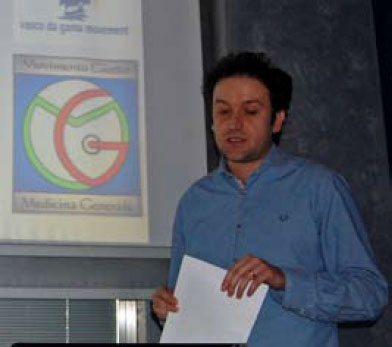From Italy - the Giotto Movement work shop
The Workshop: Launching a New Series of Activities
The workshop of the Giotto Movement was held in Bologna on April 21, 2012. During the first session, the Giotto Movement; WONCA and its Networks and Working Groups; the Vasco da Gama Movement and its history in Italy and in Europe were presented. Various ‘exchanges’ (The Hippocrates Exchange, RCGP/AiT, LOVAH/WES and SoMaMFyC) were also presented and participants shared their experiences. A discussion on the frontiers of rural medicine was triggered by the presentation of the winner of the Carosino Prize 2012, Dr Fabrizia Farolfi.
In the afternoon there was a constructive workshop where groups were created to analyse four issues of particular interest for Italian general practitioners: out-of-hours service and its problems, clinical skills in rural practice, vocational training programs of general practice, and exchanges as a tool for growth and training. Participants coming from many regions of Italy showed a considerable interest in the topics and contributed enthusiastically, sharing their own insights and suggesting constructive proposals. The contributions of senior colleagues were highly important too, as they participated in the working groups with curiosity and provided useful suggestions.

Young GPs and senior colleagues at the Giotto Movement workshop
The workshop was held at a particularly difficult time for the Italian GP trainees. Protests against the current system are being organised, as it precludes the recognition of their vocational training as a specialization; and prevents them from practicing and carrying out research with the recognition of fundamental working rights, such as paid maternity leave and a salary that enables them to be trained without worrying about how to make a living (theirs is considered among the lowest in EU: 960 euro minus taxes and contributions for the retirement fund). Furthermore, the proposed reform of the Italian general practice system hinders the future and progress of the profession. For these reasons, the workshop established that the Giotto Movement can be a real ‘thought laboratory’, where young doctors from every Italian region can discuss freely and be aided in building a new professional dignity and cultural reality in Italy.
The struggling Italian vocational training scheme
The ongoing issues of the Italian GP vocational training scheme are multidimensional. First, the education offered and its quality is highly variable among the regions (there are 20 in Italy), as each one of them organizes the specific post-graduate course autonomously, while lacking a nationwide application of a skill-based curriculum and a serious qualitative evaluation system. In this context, several excellent, but local, experiences (eg the GP vocational training school of Trento) are neither extended
nor developed at a national level.
Secondly, general practice / family medicine is not recognized as a medical specialty in Italy, unlike the majority of European countries and in contrast with the EU directives (Act 368/1999) that regulate the free circulation of medical doctors in Europe.
Finally, GP trainees are also discriminated against by colleagues of other specialties. They are considered and treated as undergraduate students: receiving poor fellowships, in contrast to the rest of the specialist trainees, who have already been recognized as “workers during specialization” and consequently, receive better salaries and rights. This situation discourages newly qualified doctors from choosing a career in general practice, even if they have the opportunity to explore such a vocational option1, thanks to the recent introduction of family medicine in several undergraduate curricula of the university medical faculties.
Time to breathe new life into the Italian GP
The Giotto Movement is a cultural association of young and future GPs, which fights to establish and enrich the general practice culture; make feasible its recognition as an autonomous and specific discipline; and enable those who choose this profession to receive post-graduate training of a high standard. This should be the cornerstone for a primary care system of quality.
The Movement was established in 2004, when a group of GP trainees appreciated the opportunity to enter the young GP context, in Europe, and start a dialogue with other foreign colleagues. Since its foundation, The Giotto Movement has strengthened this vision by recruiting new trainees and young GPs and by participating in different international initiatives promoted by the Vasco da Gama Movement. Moreover, the Giotto Movement participated in several WONCA conferences with posters and oral
presentations and investigated educational issues in Italy through the trainees’ and young GPs’ satisfaction questionnaire. This has led Giotto to be considered as an important Italian reference within the Vasco da Gama Movement of young European GPs.
What makes Giotto a distinctive movement is its constructive attitude to explore new resources and enable motivated trainees to become family physicians, offering them the opportunity to discover education, research, new organizational models in primary care, and international exchanges.
Now, more than ever, these aspects should be improved in Italy.

Dr Davide Luppi, president of the Giotto Movement
A glance abroad: investing in exchanges
Looking for something that is yet unknown is in the human nature.
This spirit led to great discoveries for the mankind and is the basis of the progress itself. Similarly, trying to understand how general practice works in other European countries can only be beneficial for the improvement of our reality and may help us think with a broader and critical mind. This effort can be supported and enriched significantly when undertaking an exchange in another country, for an on-site experience. The exchange consists of meeting new people, exploring other ways of thinking and seeking meaningful interaction with neighboring colleagues; it can offer something substantial to all participants.
Starting this year, important exchange partnerships for the Hippokrates Exchange Program have been established with France, the United Kingdom, the Netherlands and Switzerland. By actively searching for funding, our GP trainees will be facilitated in having an international experience and meanwhile, we are currently working on making this program fully recognised within the Italian vocational training course. Nevertheless, these projects need a full Government support and an innovative spirit to encourage future GP trainees to participate.
Authors: Davide Luppi, David Fasoletti, Mirene Anna Luciani, Vincenzo Palaia
References:
1. Fasoletti D, Lygidakis C, Colicchio A, Periti I, Aluttis F. Formazione: quanto soddisfa il corso di MG? M.D. Medicinae Doctor. 2011: 9; 12-4.